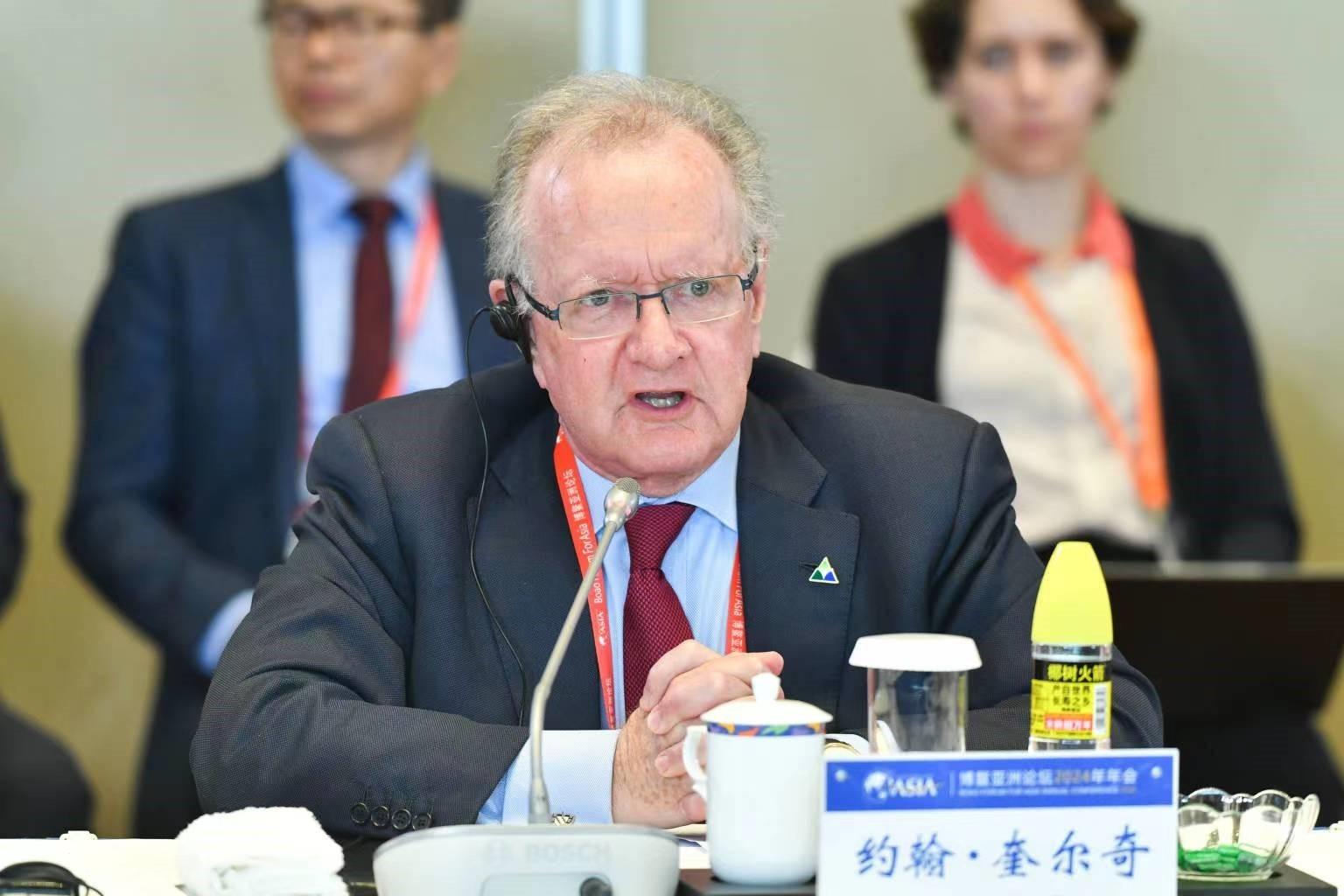 John Quelch, executive vice-chancellor of Duke Kunshan University, speaks at a panel at Boao Forum For Asia 2024, which takes place from March 26 to 29, 2024, in Boao, Hainan province, China. (PROVIDED TO CHINA DAILY)
John Quelch, executive vice-chancellor of Duke Kunshan University, speaks at a panel at Boao Forum For Asia 2024, which takes place from March 26 to 29, 2024, in Boao, Hainan province, China. (PROVIDED TO CHINA DAILY)
Hong Kong plays a key logistic role in global supply chains and all Asian economies can take advantage of links between Hong Kong and other ports in North America, Latin America, Europe and the Middle East, said an academic and industry observer.
The Hong Kong Special Administrative Region can serve as leverage for Southeast Asian countries to efficiently channel export goods to the entire world, said John Quelch, executive vice-chancellor of Duke Kunshan University, which is based in Kunshan, China’s Jiangsu province.
Speaking to China Daily on the sidelines of the Boao Forum for Asia 2024 Annual Conference in Boao, Hainan province, he said that supply lines from the Hong Kong port to the rest of the world are very well established.
“Hong Kong has for decades been a very important logistics hub, and accordingly, I see no change in that going forward, (though) Singapore is, of course, also important.”
John Quelch said in the supply chain area, the major advantage of the Asian region is that, China, as the powerhouse of Asia, is responsible for 30 percent of manufacturing output worldwide, and that core capability is something that all Asian economies can build on
The economies of Hong Kong SAR and Singapore will both flourish “once we can really further boost global supply chains, and get them back to the pre-COVID level”, said Quelch, whose academic career includes a stint as a professor of business administration at Harvard Business School in the United States.
He noted that the COVID-19 pandemic has underscored the need to enhance the robustness of global supply chains, and one way to overcome it is to boost the resilience of the industry chains in Asia with building on the strengths of China.
In the supply chain area, the major advantage of the Asian region is that, China, as the powerhouse of Asia, is responsible for 30 percent of manufacturing output worldwide, and that core capability is something that all Asian economies can build on, Quelch said.
He added that Asian countries, particularly the Association of Southeast Asian Nations (ASEAN) members, can “piggyback” in a way, on the reputation that China has built, and also on the reliance of other parts of the world on Asia-based supply chains.
“What needs to happen is better coordination across borders within ASEAN, and the Asia region more broadly, to ensure that there is free flow of goods without impediment from tariffs and non-tariff barriers,” Quelch added.
Ensuring this calls for “trust and confidence between governments and between businesses, that the goods will be able to flow freely and without sudden disruptions due to change in regulations or a change in the tariff structure”, he said.
Asian region can help itself by collaborating further through the existing international trade partnerships to reduce non-tariff barriers that still exist, as well as to take down some tariffs.
This will improve the free flow of goods and services to the benefit of all people within the region, Quelch said.
In regard to geopolitics undermining Asian economic prospects, he said that conflicts are always a negative, and that peace is important.
That said, the region can still overcome obstacles and ride new opportunities.
A tremendous opportunity in the supply chain area comes from the application of artificial intelligence (AI) and blockchain technology, which will add tremendous value and bring down costs in the global supply chain, Quelch said.
He said that technology improvement and innovation is always a source of potential advancement for mankind. If new technologies are harnessed appropriately, they can help move all people toward a more prosperous and peaceful lifestyle.
“So this is a great opportunity for all of our companies internationally to get behind global standards that will enable the blockchain technology to be applied successfully to global supply of goods and services.”
Quelch also said that the Belt and Road Initiative (BRI) has served as a very important vehicle for Chinese investments overseas, aiding other nations in accelerating their economic development.
The BRI has been a “very, very important initiative on behalf of China, and I'm very confident that many recipients of BRI investments and collaborations have benefited”, said the expert.


